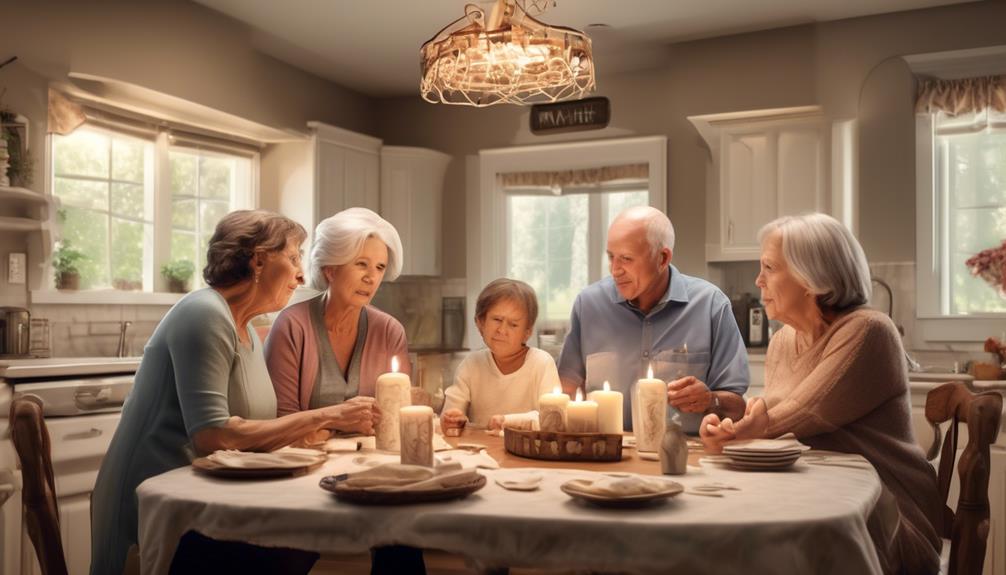Let’s delve into the goals and principles that govern end-of-life care. This unique type of care offers various services tailored to support individuals nearing the end of their life, including pain management and emotional support.
But what exactly does it entail? Well, buckle up as we navigate through the intricacies of this crucial aspect of healthcare that touches the core of our humanity.
Key Takeaways
- End-of-life care encompasses physical, mental, emotional, and spiritual needs.
- Compassionate support enhances patient satisfaction and overall well-being.
- Palliative Care and Hospice focus on comfort and symptom management.
- Advance care planning empowers individuals and reduces stress for families and healthcare providers.
Understanding End of Life Care Components
Understanding the components of end of life care is essential for providing comprehensive support during the challenging period surrounding death. Care at the end of life encompasses a holistic approach that addresses not just the physical health needs but also the mental, emotional, and spiritual well-being of the individual.
Hospice and palliative care play crucial roles in ensuring comfort and dignity for the dying person. These specialized forms of care focus on symptom management, pain relief, and enhancing quality of life in the final stages. In addition to the person facing the end of life, family members also require support to navigate this difficult journey.
Providing comfort, spiritual support, and guidance in making decisions aligning with the individual's wishes are fundamental aspects of end of life care. By recognizing and addressing these essential components of care, we can help create a supportive environment that promotes peace and acceptance during this profound transition.
Importance of Compassionate Support

Compassionate support is a cornerstone of end-of-life care, providing essential physical, emotional, and spiritual comfort for individuals navigating this challenging journey. When we offer compassionate care in end-of-life situations, we not only attend to the immediate needs of the individual but also contribute to their overall well-being.
Here are four ways compassionate support makes a difference:
- Enhanced Patient Satisfaction: Compassionate care at the end of life has been shown to lead to higher levels of patient satisfaction, ensuring that individuals feel heard, valued, and respected during this significant time.
- Improved Quality of Life: By addressing the physical, emotional, and spiritual needs of individuals, compassionate support can significantly enhance their quality of life, allowing them to find comfort and peace in their final days.
- Reduced Anxiety, Depression, and Loneliness: Providing compassionate care can help alleviate feelings of anxiety, depression, and loneliness, offering much-needed emotional support during a challenging period.
- Emphasis on Dignity, Respect, and Empathy: Compassionate end-of-life care underscores the importance of treating individuals with dignity, respect, and empathy, honoring their journey and valuing their unique experiences.
Enhancing End-of-Life Experience Options
Enhancing end-of-life experience options involves providing comprehensive support that addresses physical, mental, spiritual, and practical needs for individuals approaching the end of life. The National Institute on Aging emphasizes the importance of Palliative Care and Hospice in ensuring comfort at the end of life. NIA scientists stress the significance of end-of-life care, emphasizing the need for holistic care planning to enhance the quality of life for the dying person.
Caregiving tips from experts in Hospice and Palliative Care suggest managing pain, breathing issues, skin problems, and fatigue to ensure physical comfort. Mental and emotional support is vital, including creating a comforting environment and encouraging the sharing of memories. Addressing spiritual needs through faith and affirming relationships is essential.
Practical support is also crucial, providing assistance with daily tasks, organizing personal affairs, and offering relief to caregivers. By integrating these elements, individuals facing terminal illness can experience a more compassionate and supportive end-of-life journey.
Palliative Care Vs. Hospice Care

As individuals near the end of life, distinguishing between palliative care and hospice care becomes crucial in ensuring appropriate support tailored to their specific needs and circumstances. Palliative care focuses on improving the quality of life for individuals with serious illnesses, addressing physical, emotional, social, and spiritual needs. In contrast, hospice care is specifically designed for terminally ill patients with a prognosis of six months or less to live, providing comprehensive support for both the patient and their loved ones.
- Palliative care can be initiated at any stage of illness, offering holistic support from diagnosis onwards.
- Hospice care, on the other hand, is typically offered when curative treatments are no longer effective, focusing on comfort and symptom management.
- Palliative care teams consist of doctors, nurses, social workers, chaplains, and nutritionists working together to provide holistic support.
- Hospice care can be delivered in various settings, including at home, in nursing homes, hospitals, or dedicated hospice centers, ensuring comfort and quality of life for the terminally ill.
These distinctions are essential in navigating end-of-life issues and providing the most appropriate care for individuals facing terminal illnesses.
Advance Care Planning and Decisions
When approaching end-of-life care, engaging in advance care planning is a crucial step towards ensuring one's medical preferences are honored in the event of incapacity. Advance care planning involves documenting preferences for medical care, including appointing a healthcare proxy or power of attorney to make decisions on your behalf. This process can encompass various advance directives such as living wills, do-not-resuscitate orders, and healthcare power of attorney. According to the National Institute on Aging (NIA), studies indicate that only about a third of adults in the US have completed advance directives. By engaging in advance care planning, individuals can reduce stress for their families and healthcare providers, as well as ensure that their wishes regarding medical care preferences are respected, especially in situations involving terminal illness. Making informed healthcare decisions through advance care planning is a proactive approach to end-of-life care that empowers individuals to have a voice in their medical treatment even when they may no longer be able to communicate their preferences.
| Advance Care Planning | Key Points |
|---|---|
| Documenting preferences | Appointing a healthcare proxy or power of attorney |
| Advance directives | Living wills, DNR orders, healthcare power of attorney |
| Importance | Reducing stress, honoring wishes, empowering individuals |
Frequently Asked Questions
What Is Considered End-Of-Life Care?
When considering end-of-life care, we focus on providing holistic support and medical assistance during the period surrounding death. Our approach involves meeting physical, mental, spiritual, and practical needs of individuals nearing the end of life.
We ensure a peaceful passing by respecting and honoring the preferences and wishes of the dying person. This care is vital for addressing discomforts like pain, breathing issues, skin problems, and digestive concerns.
What Happens at the End of Life?
At the end of life, various physical discomforts like pain, breathing issues, and skin irritation may arise. Addressing these with medications like morphine is common. Emotional and mental support, physical contact, and creating a comforting environment are crucial during this time.
Spiritual needs, finding meaning and seeking comfort through faith, become more pronounced. Ensuring practical support, such as assisting with daily chores and organizing personal affairs, is essential for end-of-life care.
How Long Before Death Does End-Of-Life Care Start?
End-of-life care typically starts when a person is expected to pass away within 12 months. The timing can vary depending on the individual's needs, ranging from days to more than a year.
It's crucial to recognize when someone could benefit from this support. Beginning end-of-life care promptly ensures appropriate planning and assistance during the final stages of life.
What Are the 4 Stages of End-Of-Life Care?
We understand the importance of knowing the 4 stages of end-of-life care.
First, diagnosis is crucial for recognizing life-limiting conditions. Treatment discussions follow this stage.
Transitioning to hospice or palliative care prioritizes comfort when curative options are no longer viable.
Finally, bereavement support provides counseling after a loved one's passing.
These stages aim to ensure a dignified and peaceful end-of-life journey for the patient and their family.
Conclusion
In the end, we all deserve the dignity and compassion that end-of-life care provides.
So, let's make sure to plan ahead, communicate our wishes, and advocate for quality care.
Because when the time comes, we want to be surrounded by love, respect, and understanding – not caught in a bureaucratic maze or left to suffer needlessly.
Let's strive for a peaceful and meaningful transition, because in the end, that's what truly matters.










